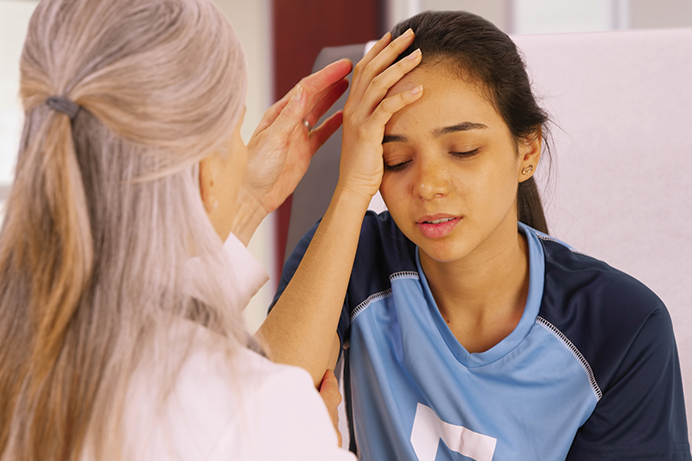How to Prevent Concussions in Kids
April 23, 2024

Concussions are all too common in youth sports, on playgrounds and even in the home. Symptoms usually go away within a few days to a month. But sometimes, they last longer and affect a child’s ability to learn, concentrate and participate in everyday activities.
The good news is that parents, kids, teachers and coaches can take steps to prevent concussions. And early treatment from a health professional can help speed recovery when a concussion happens.
What is a Concussion?
A concussion is a type of traumatic brain injury (TBI) that causes the brain to bounce around or twist in the skull.
A bump, blow or jolt to the head can cause a concussion. So can a hit to the body that forces the head and brain to jerk back and forth. The sudden movement creates chemical changes in the brain. Sometimes, a concussion stretches and damages brain cells.
How to Prevent Concussions...

Babies and toddlers can get concussions, too, whether at home or in the car. Take these precautions to protect your young child from a traumatic brain injury:
- Don’t let other children carry your baby.
- Never leave your baby unsupervised on a bed or couch.
- Always use safety straps on changing tables and in highchairs and grocery carts.
- Childproof your home to prevent falls and other accidents.
- Put gates at the top and bottom of stairwells.
- Stabilize furniture that could tip over, such as bookcases.
- Put window guards on windows and keep windows closed and locked.
- Go to playgrounds with soft ground surfaces like mulch (not dirt or concrete).
Car accidents can also lead to concussions. Have your kids use the proper car seat, booster seat and/or seatbelts whenever they’re in a car.
What to do if Your Child Suffers a Head Injury
If you think your child may have a concussion, it’s essential to seek medical help, says Matthew Fazekas, MD, a pediatric sports medicine specialist and a member of the team of physicians at Joe DiMaggio Children’s Hospital Concussion Clinic. He advises that parents look for the following signs and symptoms after a head injury:

- Amnesia (not remembering the injury)
- Confusion or feeling as if in a fog
- Delayed response to questions
- Dizziness or “seeing stars”
- Fatigue
- Headache or a feeling of pressure in the head
- Nausea
- Ringing in the ears
- Slurred speech
- Temporary loss of consciousness
- Vomiting
Dr. Fazekas says if your son or daughter has concerning signs or symptoms of concussion, they should be pulled from sports immediately and evaluated by a healthcare professional. Your child will undergo a full neurological examination. They may undergo neurocognitive testing within the office, and then will start a process of returning to learning and sports as directed by their physician.
Concussions can be harder to recognize in young children, who may not be able to describe how they feel. Nonverbal clues of a concussion may include:
- Appearing dazed
- Change in eating or sleeping patterns
- Excessive crying
- Irritability and crankiness
- Lack of interest in favorite toys
- Listlessness and tiring easily
About the Concussion Clinic
The Concussion Clinic at Joe DiMaggio Children’s Hospital is led by world-class physicians who are board-certified in sports medicine, pediatric neurology, pediatric physical medicine and rehabilitation, pediatric neuropsychology and a team of certified vestibular therapists.
Dr. Fazekas and several other JDCH specialists work at the clinic, including Diana Martínez, MD, medical director of the Division of Pediatric Neurology; Virmarie Quiñones-Pagán, MD, a pediatric rehabilitation specialist; and Christina M. Zafiris, PhD, a pediatric neuropsychologist.
![Concussion Tips & Symptoms - [U18] Sports Medicine](https://i.ytimg.com/vi/1vO0mpUsvLk/maxresdefault.jpg)


